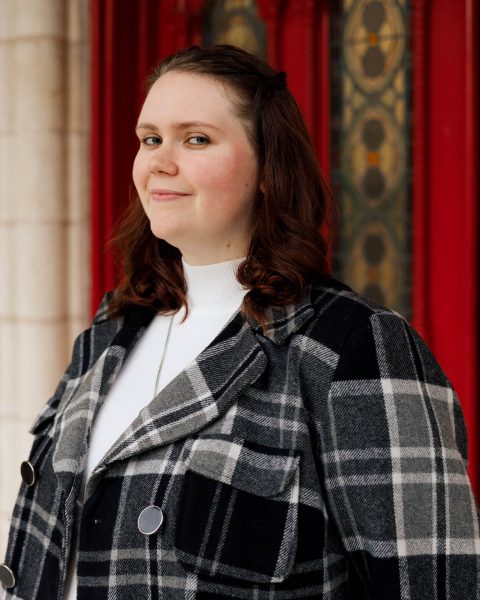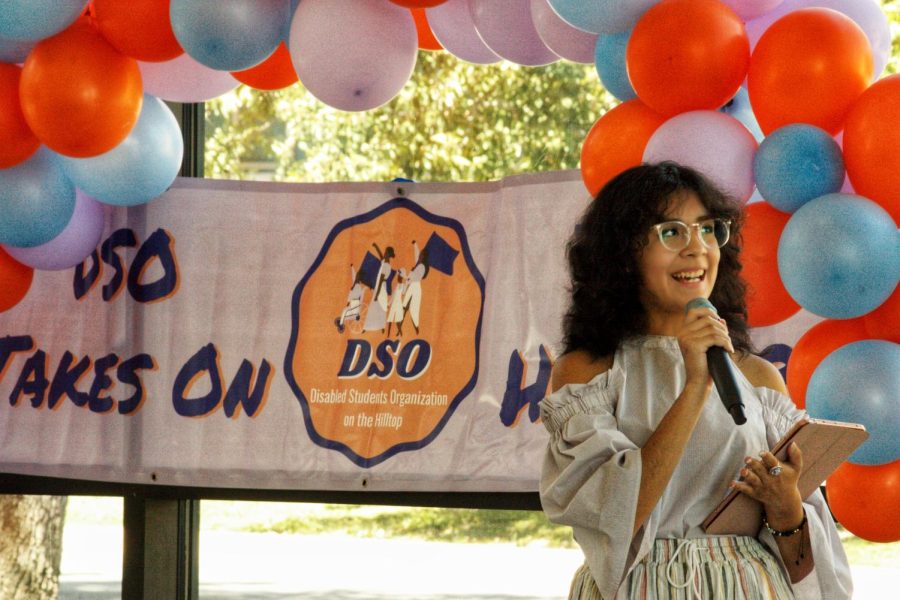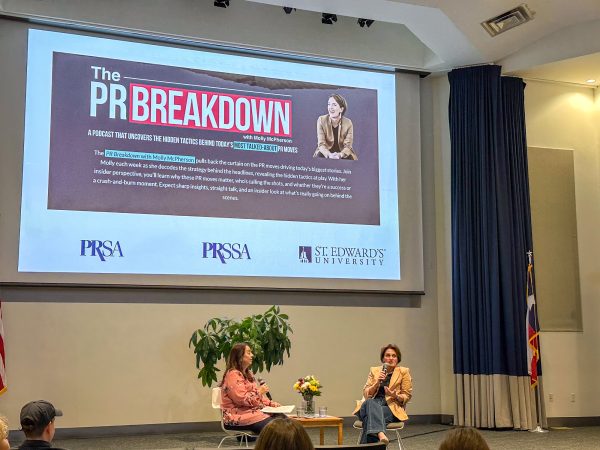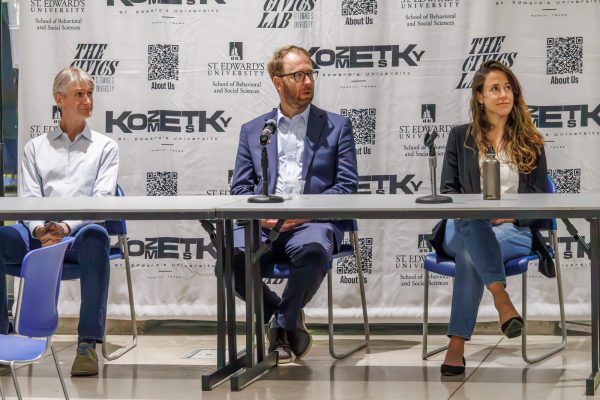DSO’s first History of Resistance symposium encourages students to take on their world
Melissa Gunning / Hilltop Views
Nic Chuecas presenting in front of attendees, surrounded by colorful balloons. They were representing Monarchs on the Hilltop and explained the symbolism behind the organizations logo: the monarch butterfly.
St. Edward’s University endorsed the Disabled Students Organization’s first History of Resistance symposium on Oct. 1. At this event, various faculty and students presented on past and present social justice movements impacting activism and advocacy.
Presenters at this event included students Ethan Tobias, Al Whitaker, Alexis Reed, Nic Chuecas, Kelly Salinas, Logan Counce and professors Daniel Glenn and Alex Barron.
The History of Resistance commenced with a keynote address by Esther Heymans, DSO Chair of Education and Advocacy, and treasurer Abigail “Abbi” Pullen. Their address took attendees from the early history of America to the passing of the Americans with Disabilities Act in the 1980s.
“Disabled people still face a lot of discrimination(s) that the ADA doesn’t totally protect against,” Pullen said.
Ethan Tobias, Students of Sustainability president and Office of Sustainability intern, was the first of the presenters. He educated the audience on the social movement toward environmental justice. Tobias shared the changes government offices have undergone and what attendees could do to create positive environmental change.
“Live like you love the Earth,” Tobias said.
Tobias’ presentation was followed by another student, DSO chair of community outreach Al Whitaker. Whitaker’s presentation centered around Hawaiians who are currently protesting against the construction of a space telescope on Mauna Kea, a sacred place to indigenous Hawaiians.
History professor Daniel Glenn, the first faculty presenter of the day, explained the circumstances that led Texas to the failed Córdova Rebellion in 1838. Glenn shared how the influx of Anglo Texans pushed out the Tejanos, the Mexican Americans living there before them.
Glenn presented this unsuccessful rebellion to “highlight the resistance.”
“They didn’t do it passively,” he said.
After Glenn’s presentation on one specific instance of resistance, Black Student Alliance president Alexis Reed took a more universal approach, explaining what constitutes successful movements towards social change.
“Do not be discouraged.” Reed said. “You have to be resistant. You have to be persistent.”
Reed introduced the concept of the civil rights movements, emphasis on the plural. She was the first presenter in the symposium to highlight how many of these social movements occurred at the same time and influenced one another.
Reed cited this time period as the beginning of activism and advocacy tactics that are still in use. People today are eager and unapologetic when it comes to social change.
“It’s normal because (the civil rights movements) laid the foundation for us,” Reed said.
Monarchs on the Hilltop, a university organization with the mission of protecting undocumented students and those from mixed-status families, was represented by president Nicole Chuecas. Chuecas explained the symbolism of the monarch.
“(These butterflies) travel great distances to survive and find opportunity,” they said. “Migration and transformation, in fact, are what make us beautiful.”
Chuecas shared examples of undocumented immigrants protesting, holding up signs that read “No Papers, No Problem.” The organization also promoted their UndocuWeek from Oct. 31 to Nov. 4.
Kelly Salinas, on behalf of Campus Ministry, led a brief reflection on how people are called to justice through spirituality. She explained how the school’s Holy Cross values support diversity, social justice, equity and inclusion.
“Using spirituality as a propellant justice means reflecting on what every human deserves and filling in the gaps, because it is what we’re called to do as souls who believe in something more,” Salinas said.
English professor Alex Barron, who concentrates on queer and women’s literature, broke down myths regarding the 1969 Stonewall Riots. She challenged the riots as being the start of the gay liberation movement, offering alternatives like the 1920s Harlem Renaissance or the 1966 riot at Compton’s Cafeteria.
“Who does (each event) center? What does that enable us to see?” Barron said. “I think it’s really fascinating to think about.”

Melissa Gunning is graduating this December with a degree in psychology, minor in writing and rhetoric and certificate in evidence-based addiction counseling....









